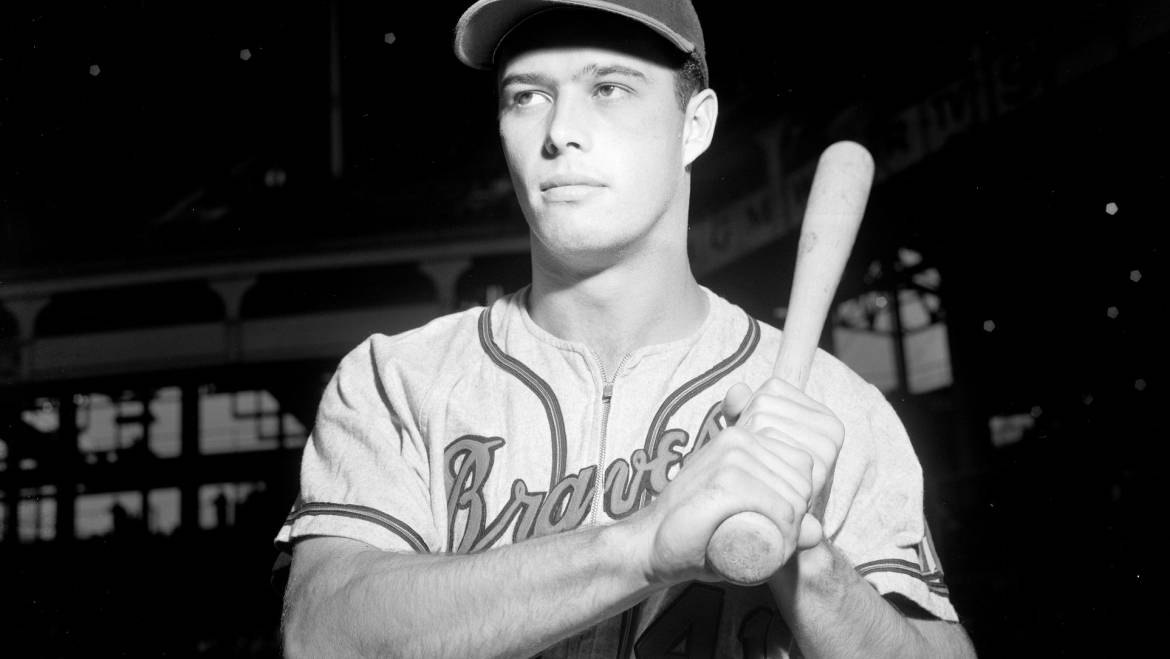During those long-ago growing-up years, my brother seemed quite certain about the identity of his favorite baseball player: Mickey Mantle of the New York Yankees. I liked the Mick too—what was there not to like?—but it was clear that I needed my own favorite player. For reasons both rational and arbitrary, I chose Eddie Matthews, third baseman of the Milwaukee Braves. Matthews was then quite a prominent figure in the national pastime, and furthermore I liked his name. It just sounded cool and sleek and powerful. Eddie was my man.
He was born in the northeast corner of Texas, in Texarkana, but his family soon moved to Santa Barbara, California. He stood 6′ 1″, weighed 190 pounds and batted left-handed. Matthews’ major league debut came on April 15, 1952, when the Braves were still in Boston. His sweet stroke soon won the admiration of an aging Ty Cobb. When Matthews led the majors with 47 home runs in just his second year, people began making lofty predictions, even that he might some day eclipse Babe Ruth’s career mark of 714!
In 1954, a new player joined the Braves—Hank Aaron. He and Matthews would combine for 863 home runs as teammates, topping the previous record set by Ruth and Lou Gehrig of the Yanks. Matthews had been a sub-par defensive player when he got to the bigs, but he worked assiduously and became one of the top third basemen in the sport. In Game 7 of the 1957 World Series, the Yankees had the bases loaded when Matthews made a back-handed stab of Bill Skowron’s hard-hit grounder, stepped on third and instigated a big celebration in Milwaukee. (He also had a walk-off home run in the 10th inning of Game 3.) Besides Aaron, I remember well the names of some of Matthews’ teammates in ’57: Lew Burdette, Joe Adcock, Del Crandall, Bill Bruton, Warren Spahn and Bob Buhl.
Matthews, who wore No. 41 on his jersey, was not perfect. The Braves were back in the Series the next year, and again it went to seven games but Casey Stengel’s club came out on top in part due to Matthews’ record 11 strikeouts. A big swinger, he whiffed a lot—1,487 times in his 17-year career. Only thrice (in 1953, 1959 and 1961) did he bat over .300. He had a reputation as being gruff with reporters and in an autobiography published in 1994, he confessed to having been a heavy drinker throughout most of his baseball career.
You messed with Eddie Matthews at your peril. The Dodgers’ Jackie Robinson found this out in 1954 when he came sliding into third base with spikes high. Matthews responded, shall we say, in a vigorous manner. Five years later, a similar incident took place at third with Frank Robinson; Matthews gave the Reds’ star outfielder a fearsome pounding. In fact, the Braves’ pitchers never had to worry about opposing players charging the mound. They had standing orders from Matthews to get out of the way because he would take care of things.
Back and shoulder injuries curtailed his effectiveness, and he became much less productive in his final seasons. Matthews was on the roster of the 1968 Detroit Tigers and did not play much in that year’s World Series versus the St. Louis Cardinals. But he had a major impact by helping to quell a clubhouse rebellion against manager Mayo Smith. The Tigers—Al Kaline, Denny McLain, Willie Horton, Mickey Lolich, Bill Freehan, et al.—respected Matthews highly. They beat the Cards in seven. He retired soon thereafter with 512 home runs, then the eighth most of all time. Matthews was hired as the Atlanta Braves’ manager in 1972, but he had middling success and was fired after just two seasons. He was somewhat irked to have to wait five years before being elected to the Baseball Hall of Fame, but that honor finally came in 1978. The Sporting News compiled a list of the greatest players of all time in 1999 and ranked Matthews at No. 63.


Add Comment